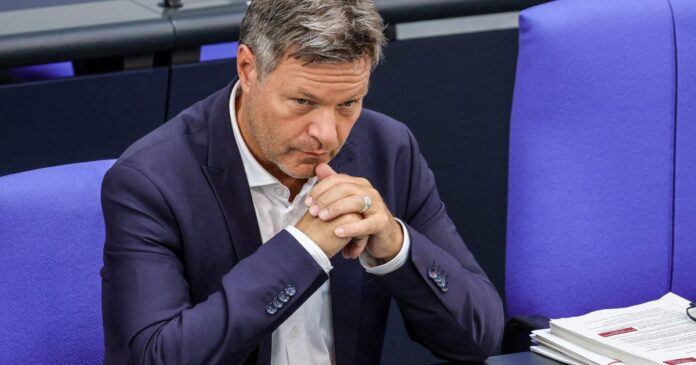Germany faces five difficult years of green industrial transition that “will put a burden” on people, Economy Minister Robert Habeck warned — while urging his government to approve fresh subsidies to safeguard the country’s industrial base.
Reacting to a new report by the International Monetary Fund that projects Germany’s economy will shrink 0.3 percentage points this year, Habeck told German public broadcaster ARD on Wednesday evening, “The data certainly isn’t good.”
Germany’s statistical office had already warned in May that the country entered into a recession, and that some of Germany’s biggest companies have begun to ditch the fatherland, triggering fears of deindustrialization.
Habeck argued that this downturn could be explained by high energy prices, which Germany felt more intensely than other countries because it relied on cheap Russian gas. High interest rates are also slowing down investments and global trade, he added, which particularly affects Germany as an export-dependent nation.
While stressing that there was “no reason” to react to these problems with “German Angst” — referring to a catchword describing the fear and hesitancy stereotypically connected with Germans facing major challenges — Habeck later in the TV interview himself made some blunt remarks.
“I also don’t want to ignore the fact that this will put a burden on people,” Habeck said. “We have a major transformational period ahead of us until 2030,” during which time Germany would move from a traditional, fossil fuel-dependent industrial base to green energies like hydrogen, he said.
He advocated state support in the form of a cap on electricity prices for energy-intensive companies in international competition, “so that they can withstand the challenges of the transformation and have enough money to invest.”
Habeck, a senior politician with the Greens — a party which has a history of proposing debt to solve problems — admitted that the proposed energy subsidies, which he has been promoting for months, still lack a majority within the governing coalition. That includes the fiscally conservative Free Democratic Party (FDP) of Finance Minister Christian Lindner along with the Social Democratic Party of Chancellor Olaf Scholz, which has so far stuck with Lindner in opposing Habeck’s plans.
Yet the Green politician, who also acts as vice chancellor, argued that essentially Germany has to decide between breaking with its debt rules — a no-go for Lindner’s FDP — or risking the loss of its industrial base.
“The question is: Do we borrow money or do we no longer have industry?” Habeck said.
He added: “We don’t have much time left, otherwise companies will say: We’ll invest, but no longer in Germany.”


